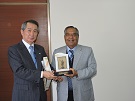Members of the VIF faculty on 01 February 2016 held a wide ranging interaction with a fifteen-member visiting delegation from Japan, led by Mr. Kenichi Watanabe, Chairman of FEC Japan India and Cultural Economic Exchange Committee and comprising of a few eminent industrialists and businessmen leaders. Mr. Arvind Virmani, a former Chief Advisor (Dev. Policy) to the Indian Planning Commission and subsequently Chief Economic Advisor to the Government of India during the UPA’s regime, Mr. Vikas Khitha, responsible for business development for L&T Group's Financial  Services, Adm (retd) KK Nayyar, and Lt Gen (retd) Ravi Sawhney, among others, formed the panel that interacted with the visiting Japanese delegation.
Services, Adm (retd) KK Nayyar, and Lt Gen (retd) Ravi Sawhney, among others, formed the panel that interacted with the visiting Japanese delegation.
The interaction kicked off with General (retd) NC Vij, formerly COAS and presently the Director, VIF, underlining the need for further cementing of ties between Japan and India, two Asian democracies sharing common national ethos and cultural linkages and facing common security challenges. The ensuing interaction however underlined that strengthening of the bilateral relationship is further mandated by a depleting global economic environment, especially China hitting an economic downslide, and India emerging as the next most favoured destination for foreign direct investment across the world. What makes the Indian case even more potent is that the country is driven by a dynamic leadership and is heading for an inbound growth, part of the economy that remains insulated from external upheavals. It was also highlighted during the interaction that a mating of Japanese technologies and capital investments with Indian production facilities, especially the easy availability of raw materials, a skilled, youthful and affordable work force, ease of doing business etc. is a win-win situation for both, a higher returns on the Japanese capital investments and a more prosperous India capable of taking on greater security responsibilities in the region. The interaction also touched on the emerging  security scenario in the region and the role India could play in providing a stable and more secure regional security environment. The impression one got from the interaction was that an energized strategic partnership between Japan and India is not only mutually beneficial but it is also in the interest of the region. The Japanese delegation sought some clarity on the still pending land bill, GST, labour laws etc. Their concerns were adequately addressed by the Indian interlocutors. The consensus view that emerged from that session was that it is the joint vision and the personal chemistry between the two Prime Ministers, Mr. Shinzo Abe and Mr. Narendra Modi, that will take the bilateral relationship to new heights in the foreseeable future. The Director thanked the delegation for choosing to visit the VIF and highly appreciated the free and candid exchange of views witnessed throughout the session.
security scenario in the region and the role India could play in providing a stable and more secure regional security environment. The impression one got from the interaction was that an energized strategic partnership between Japan and India is not only mutually beneficial but it is also in the interest of the region. The Japanese delegation sought some clarity on the still pending land bill, GST, labour laws etc. Their concerns were adequately addressed by the Indian interlocutors. The consensus view that emerged from that session was that it is the joint vision and the personal chemistry between the two Prime Ministers, Mr. Shinzo Abe and Mr. Narendra Modi, that will take the bilateral relationship to new heights in the foreseeable future. The Director thanked the delegation for choosing to visit the VIF and highly appreciated the free and candid exchange of views witnessed throughout the session.









